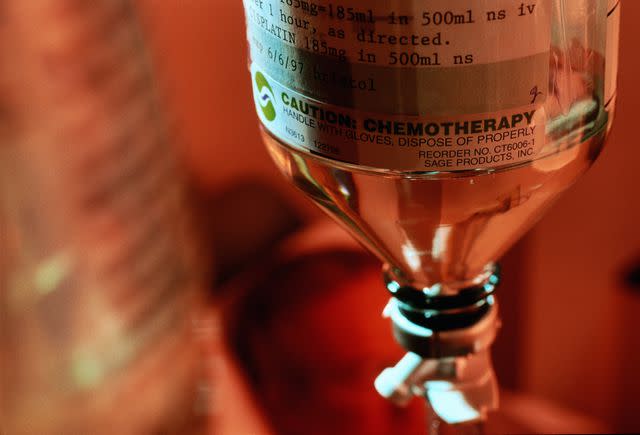Top 10 Biologic Medications in the United States
These drugs are changing the way illnesses are treated
Fact checked by James LacyMedically reviewed by Do-Eun Lee, MD
Biologics are drugs made from complex molecules manufactured using living microorganisms, plants, or animal cells. Many are produced using recombinant DNA (rDNA), a technology that involves joining DNA molecules in a laboratory to produce new genetic combinations. Biologics are sometimes referred to as biopharmaceuticals or biological drugs.
Biologics are changing the way healthcare providers treat common conditions. For certain conditions, biologics are becoming more commonly prescribed than traditional drugs. Rheumatoid arthritis, certain cancers, and diabetes have the greatest numbers of dedicated biologic treatments.
This article discusses the top 10 biologic drugs in the United States and what they are used for.
How Biologic Medications Work
Biologic drugs target specific proteins or cells in your body. For example, biologic drugs designed to treat rheumatoid arthritis block certain inflammatory proteins or pro-inflammatory cells. Biologic cancer treatments help the body's own immune system identify and destroy cancer cells.
Biologics don't always work for everyone, and it can be challenging to find the right biologic medication. They can also have severe, sometimes life-threatening side effects.
Generic Biologics
While most drugs are chemicals synthesized from other chemicals, biologics are much more expensive due to their complex manufacturing process. Because of their high cost, there is a great demand for generic versions of biologic medications.
Several pharmaceutical companies are lobbying for the right to manufacture generic versions. However, because they are so difficult to manufacture, there are concerns about the ability to manufacture generics both safely and reliably.
Takeaway
They're not exactly generics, but in recent years, numerous biosimilars have come on the market, usually at a much lower cost than the original biologic they're based on.
Related: Biosimilars vs. Biologics for Treating Psoriatic Disease
Top 10 Biologics
The top 10 biologic drugs all have exceeded the monetary definition of a "blockbuster," meaning they've generated more than $1 billion in annual sales, according to 2017 sales data reported by drug manufacturers.
Humira

The anti-inflammatory drug Humira (adalimumab) is not only the best-selling biologic, it's one of the best-selling drugs worldwide, regardless of class.
Humira is approved for:
Rheumatoid arthritis
Polyarticular juvenile idiopathic arthritis
Manufacturer: AbbVie, an Abbott Laboratories spinoff
Global Sales in 2017: $18.4 billion
Generic name: Adalimumab
Launch date: 2002
Side Effects
Humira has risks and can cause serious side effects in some people. Discuss these risks with your healthcare provider before you start taking Humira.
Some of these side effects include:
Serious infections including tuberculosis, bacterial sepsis, and invasive fungal infections
An increased risk of developing certain cancers such as lymphoma and basal or squamous cell skin cancers
Other, less serious side effects may include:
Pain, rash, swelling, or itching at the injection site
Upper respiratory infection
Headaches
Nausea
Rash
Rituxan

Rituxan (rituximab) was developed by IDEC Pharmaceuticals. It's currently co-marketed in the United States by Biogen Idec and Roche subsidiary Genentech.
Rituxan is approved for:
Rheumatoid arthritis
Granulomatosis with polyangiitis
Manufacturer: Roche
Global Sales in 2017: $9.2 billion
Generic name: Rituximab
Launch date: 1997
Side Effects
It is possible to experience serious side effects while taking Rituxan. These may include:
Severe skin reactions including sores and ulcers, blisters, rash, and peeling skin, which may occur on your lips and mouth or on other parts of your body
Reactivation of hepatitis B virus in people who are carriers or who have recovered from hepatitis B
Progressive multifocal leukoencephalopathy, a serious brain infection that can cause death or severe disability
Tumor lysis syndrome, a condition caused by the rapid breakdown of cancer cells that can lead to kidney failure
Heart problems such as irregular heartbeat, chest pain, and heart attack
Bowel blockage or tears in people taking Rituxan with chemotherapy medications
Severe allergic reaction (anaphylaxis)
Other side effects of Rituxan include infusion-related reactions such as nausea, fever or chills, headache, flushing, and shortness of breath.
Enbrel

Enbrel (etanercept) was developed by researchers at Immunex. Today the drug is co-marketed in North America by Amgen and Pfizer, by Takeda Pharmaceuticals in Japan, and by Wyeth in the rest of the world.
Enbrel is approved for:
Rheumatoid arthritis
Plaque psoriasis
Psoriatic arthritis
Polyarticular juvenile idiopathic arthritis
Ankylosing spondylitis
Manufacturer: Pfizer/Amgen
Global Sales in 2017: $7.9 billion
Generic name: Etanercept
Launch date: 1998
Side Effects
Enbrel can cause serious side effects such as:
New infections or worsening of existing infections, including hepatitis B reactivation
New or worsening heart failure
Nervous system problems, including multiple sclerosis and seizures
Life-threatening blood problems
New or worsening psoriasis
Severe allergic reaction (anaphylaxis)
Autoimmune reactions including autoimmune hepatitis or a condition that causes lupus-like symptoms
Less serious side effects include:
Upper respiratory infection
Pain, swelling, itching, or rash at the injection site
Herceptin

Herceptin (trastuzumab) was developed by Genentech, now a Roche subsidiary, and UCLA's Jonsson Comprehensive Cancer Center.
Herceptin is approved for:
HER2+ metastatic gastric or gastroesophageal junction adenocarcinoma
Manufacturer: Roche
Global Sales in 2017: $7.4 billion
Generic name: Trastuzumab
Launch date: 1998
Side Effects
Herceptin can cause serious side effects, including infusion reactions that may be fatal. These can include:
Increased risk of infection
Respiratory distress
Severe allergic reaction (anaphylaxis)
Low blood pressure
Other serious side effects may include:
Damage to the heart or lungs
In pregnant women, Herceptin may harm the developing fetus
Less serious side effects include:
Fever
Nausea and vomiting
Diarrhea
Cough
Headache
Fatigue
Rash
Muscle pain
Anemia
Avastin

When launched in 2004, Genentech's Avastin (bevacizumab) was one of the most expensive drugs on the market, with a $4,400 monthly price tag.
Avastin is approved for:
Hepatocellular cancer
Metastatic colorectal cancer
Metastatic renal cell carcinoma
Epithelial ovarian, fallopian tube, or peritoneal cancer
Glioblastoma
Non-squamous non−small cell lung cancer
Manufacturer: Roche
Global Sales in 2017: $7.1 billion
Generic name: Bevacizumab
Launch date: 2004
Side Effects
Serious side effects of Avastin may include:
Bowel or stomach perforation
Problems with wound healing
Coughing up blood
Gastrointestinal, brain, vaginal, or spinal cord bleeding
Severe high blood pressure
Stroke or heart attack
Kidney problems
Serious or fatal infusion reactions
Nervous system or vision problems including seizure, confusion, and blindness
Fistula, an abnormal passage that forms between one part of the body and another
Some less serious side effects may include:
Dry skin
Watery eyes
Change in taste
Nosebleeds
Headache
Remicade

Remicade (infliximab) was originally developed by Centocor Ortho Biotech, which is now Janssen Biotech, a Johnson & Johnson subsidiary.
Remicade is approved for:
Rheumatoid arthritis
Crohn's disease
Ankylosing spondylitis
Psoriatic arthritis
Plaque psoriasis
Ulcerative colitis
Manufacturer: Johnson & Johnson/Merck & Co.
Global Sales in 2017: $7.1 billion
Generic name: Infliximab
Launch date: 1998
Side Effects
Remicade may cause serious side effects such as:
Increased risk of infections including tuberculosis, bacterial sepsis, and fungal infection
Increased risk of certain cancers such as lymphoma, cervical cancer, and certain skin cancers
Reactivation of hepatitis B
New or worsening psoriasis
New or worsening heart failure
Abnormal heart rhythm, heart attack, and other heart problems
Liver injury
Blood problems
Infusion reactions such as stroke or anaphylaxis
An immune condition that causes symptoms similar to lupus
Less serious side effects may include:
Upper respiratory infection
Cough
Stomach pain
Headache
Lantus

Lantus (insulin glargine injection) was developed at Sanofi-Aventis's biotechnology research center in Frankfurt-Höchst, Germany.
Lantus is approved for:
Diabetes
Manufacturer: Sanofi
Global Sales in 2017: $5.7 billion
Generic name: Insulin glargine [rDNA origin] injection
Launch date: 2000
Side Effects
The most common side effect of Lantus is hypoglycemia (low blood sugar). This can be serious and life-threatening. Other serious side effects include:
Severe allergic reaction (anaphylaxis)
Heart failure in people taking Lantus along with thiazolidinediones
Less serious side effects may include:
Weight gain
Injection site reactions
Low potassium levels
Swelling
Neulasta

Neulasta (pegfilgrastim) is manufactured by Amgen Pharmaceuticals.
Neulasta is approved for:
Neutropenia related to cancer chemotherapy
Hematopoietic subsyndrome of acute radiation syndrome
Manufacturer: Amgen
Global Sales in 2017: $4.7 billion
Generic name: Pegfilgrastim
Launch date: 2002
Side Effects
Neulasta may cause serious side effects, some of which can be life-threatening. These can include:
Enlarged or ruptured spleen
Respiratory distress
Severe allergic reaction (anaphylaxis)
Sickle cell crisis in people with sickle cell disease
Kidney injury
Blood problems, including increased white blood cell count, decreased platelets, and capillary leak syndrome
Inflammation of the aortic artery
Increased risk of blood cancer
The most common side effect of Neulasta is aching bones or muscles in the arms and/or legs.
Avonex

In the U.S., Avonex (interferon beta-1α) is marketed in by Biogen Idec and by Merck under the brand name Rebif.
Gemany's Fraunhofer Institute for Interfacial Engineering and Biotechnology IGB and CinnaGen Company cloned Interferon-beta-1α and since 2006 the drug has been sold as CinnoVex, a biosimilar, in Iran.
Avonex/Rebif is approved for:
Multiple sclerosis (MS)
Manufacturer: Biogen Idec
Global Sales in 2017: $2.1 billion
Generic name: Interferon-beta-1α
Launch date: 1996
Side Effects
Avonex may cause serious side effects in some people. Some of these side effects may be life-threatening.
Mental health problems, including depression, hallucinations, and thoughts of suicide
New or worsening liver problems, including liver failure
Severe allergic reaction (anaphylaxis)
Heart problems, including heart failure
Blood problems, including low red and white blood cell count and low platelet counts
Damage to the small blood vessels
High blood pressure in the lungs
Seizures
Autoimmune conditions such as autoimmune hepatitis and hypo- or hyperthyroidism
Serious injection site reactions leading to infection or necrosis (cell death)
Common side effects include flu-like symptoms such as fever, aches, chills, and fever. Injection site reactions such as pain, itching, or redness may also occur.
Lucentis

Developed by Genentech, the injectable drug Lucentis (ranibizumab) is marketed in the U.S. by Genentech and outside the U.S. by Novartis.
Lucentis is approved for:
Macular edema following retinal vein occlusion
Diabetic macular edema
Myopic choroidal neovascularization
Manufacturer: Roche, Novartis
Global Sales in 2017: $1.5 billion
Generic name: Ranibizumab
Launch date: 2006
Side Effects
Lucentis may cause serious side effects, which may include:
Infections of the eye
Cataracts
Detached retina
Blood clots, which can lead to heart attack or stroke
Some of the most common side effects of Lucentis include:
Red eyes or eye pain
Floaters in the eye
Infections of the nose or throat
Anemia
Summary
Biologic medications are drugs manufactured from living cells. They work by targeting specific proteins or cells in the body.
Biologics are used to treat conditions such as immune diseases, cancer, and diabetes. They may not work for everyone, and they can have serious side effects. Be sure to discuss these medications with your healthcare provider before using them.
Read the original article on Verywell Health.

